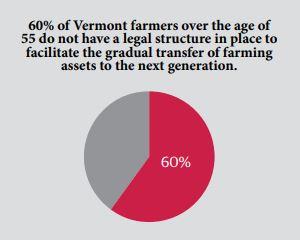

The tax and legal issues confronting existing and new farm businesses, new farm-based food enterprises, and farms in transition to the next generation are increasingly complex. Food safety, farm labor laws, business planning for farm transfer, estate planning—even the risks of hemp production— all present novel tax and legal issues that few general tax and legal practitioners in Vermont are prepared to handle. Successful new farm formation, farm diversification, and economic sustainability all depend on access to skilled legal and tax practitioners. There is a growing need for additional farm transfer assistance providers (see Succession brief). Sixty percent of Vermont farmers over the age of 55 do not have a legal structure in place to facilitate the gradual transfer of farming assets to the next generation.1 Building a network of skilled legal, tax, and bookkeeping professionals who specialize in serving farm clients could improve overall farm viability.
Access to bookkeeping, legal, and tax professionals skilled in issues unique to Vermont farms is limited, and specialized training for farm legal service providers is scant. When an attorney is consulted, too often the result is a high fee for “off the shelf” documents unsuited to a particular farm’s situation. Farmers often can’t afford legal fees. The economics of solo legal practice in rural communities is equally bleak. Vermont attorneys, like farmers, are aging.2 New England, generally, is facing a shortage of rural attorneys as lawyers in small towns retire and no one takes their place.3
Farmers most often seek tax counsel from their tax preparers, the majority of whom are uncredentialed and unfamiliar with the specialized tax rules for farms. A short-term focus on a single year’s taxes can overlook important retirement planning or estate and gift tax planning issues. Avoiding this year’s self-employment tax means there will be less in a farmer’s social security check later, for example. Also missing is a focus on creating and maintaining an accurate set of financial records, annual and multi-year budgeting, and integrating tax with business planning. Most tax preparers, like most attorneys, are ill-prepared to deal with the complex issues that can arise in the context of farm transfer or farm legal structure. In many cases, farmers would benefit from hiring a remote bookkeeper with farming-related knowledge to maintain their financial records and provide an accurate set of their books at tax time to the tax preparers.
Farmers have the best outcomes when their attorney, tax preparer/accountant, and bookkeeper work together. This happens to some extent but there should be more opportunities for interaction and knowledge sharing among these professionals.
The farm service providers funded by the Vermont Farm & Forest Viability Program have done an excellent job of providing legal structure and farm transfer planning assistance. In light of the need, however, their resources are too thinly spread.
